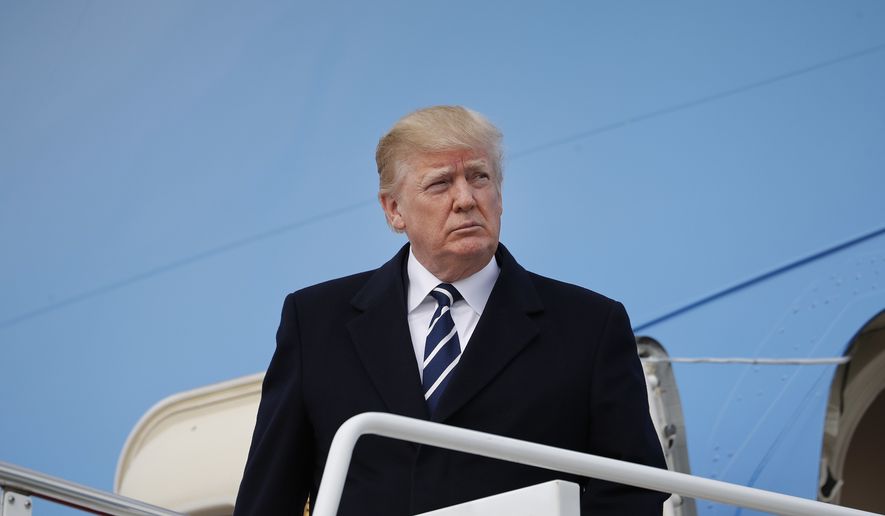Health insurers, patient groups and Senate Democrats implored the Trump administration Monday to curb or cancel its push to let Americans get around Obamacare by using cheaper, short-term health plans for a full year, saying the plan would destabilize the insurance markets and increase the number of uninsured.
The Health and Human Services Department wants to lift the three-month limit on the stopgap plans that President Obama imposed during his last year in office. It is part of Mr. Trump’s effort to extend more affordable options to healthier people who’ve been priced out of the individual market under the Affordable Care Act, after the GOP-led Congress failed to repeal and replace the 2010 law.
More than 100 patient-advocacy groups protested the proposal Monday, the final day to submit comments to HHS, noting the full-year plans could duck Obamacare rules requiring robust coverage or preventing insurers from denying sicker patients or charging them more than healthy ones.
They fear the rule will fragment the market, as healthier customers leave the Obamacare exchanges and opt into skimpier plans, forcing insurers to raise prices on costlier, sicker consumers who will remain in the program because they need robust coverage.
Allowing short-term plans “to proliferate would force individuals, including those with serious or chronic diseases and disabilities, into a smaller, sicker market to obtain the coverage they need to manage their health,” wrote the groups, including the American Health Association and March of Dimes. “Premiums for comprehensive plans that meet federal standards would likely skyrocket, and plans would likely exit the market. This will make insurance either unavailable or unaffordable for those who rely on the marketplace to get coverage.”
America’s Health Insurance Plans, the main insurers’ lobby, aired similar worries.
“We are concerned that this proposed rule will lead to more people being uninsured and under-insured, and to higher costs in the long run,” said Matt Eyles, AHIP’s incoming president and CEO. “Short-term plans can provide an important temporary bridge for Americans who are transitioning between plans. But they are not a replacement for comprehensive coverage.”
HHS officials estimated in February that 100,000 to 200,000 people might defect from the Obamacare exchanges and into short-term insurance in 2019, under the proposed framework.
It’s unclear how many people who lack current coverage will opt for short-term duration insurance instead of Obamacare-compliant plans, though the administration said they drafted the proposal with them in mind.
Mr. Eyles said the plan, if it proceeds, should not be enacted until 2020, so insurers have time to plan for a reconfigured marketplace. He also said the plans shouldn’t last longer than six months.
AHIP also said consumers need to understand that short-term plans might not cover prescription drugs, mental health care or chronic conditions, might be unavailable to people with pre-existing conditions and may impose annual or lifetime limits on coverage.
It is unclear when the administration will finalize the proposal, though HHS spokeswoman Caitlin Oakley said the Centers for Medicare and Medicaid Services will work with the Labor and Treasury departments to “thoroughly examine the public comments on the rule and publish a final rule expeditiously.”
Analysts say healthy people may consider the short-term plans a viable option because the GOP-led Congress zeroed out penalties tied to the “individual mandate” requiring Americans to hold robust coverage or pay a tax.
Democrats want Republicans who control the levers of political power in D.C. to bolster the wobbly markets with new funding or taxpayer-funded options, instead of siphoning current customers away from Mr. Obama’s program.
“We are committed to making health insurance premiums more affordable for all consumers and expanding the number of options, and we stand ready to work with the Administration and our colleagues in Congress to achieve these goals,” dozens of Senate Democrats wrote to HHS on Monday. “Unfortunately, creating a new class of health insurance plans that lack basic patient protections and could lead to higher prices for seniors, those with pre-existing conditions, and any American who wants to purchase a plan with comprehensive benefits does not achieve this goal.”
Democrats said they’re particularly worried that HHS will let consumers renew the short-term plans, “creating a permanent market for junk plans.”
• Tom Howell Jr. can be reached at thowell@washingtontimes.com.




Please read our comment policy before commenting.